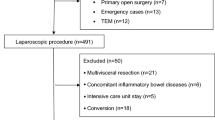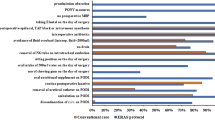Summary
Background
Restrictive perioperative fluid management is an essential element of enhanced recovery after surgery (ERAS), but the exact definition of quality and quantity of administered fluid is missing. In this retrospective analysis, we analysed the amount and effect of fluid administration in routine surgical practice following the recommendation of ERAS.
Methods
A total of 192 consecutive patients, 72 (38 %) female, with a median (range) age of 64 (19–93) years and a median (range) body mass index of 25 (14–39) kg/m2 were analysed. Patients were divided by the median intraoperative fluid administration of 0.15 ml/kg/min.
Results
Median (range) volume of fluid administration was 2500 (300–5000) ml cristalloids and 100 (0–3000) ml colloids. Total complication and anastomotic leakage rate was 19 and 3 % in group A with less fluid administration and 25 % (p = 0.23) and 6 % in group B (p = 0.26), respectively.
Conclusion
Amount of intraoperative fluid administration was within the range of ERAS trials, and complication rate was comparable. Less fluid administration showed a non-significant decrease in the overall complication and anastomotic leakage rate.
Similar content being viewed by others
References
Kehlet H. Multimodal approach to control postoperative pathophysiology and rehabilitation. Br J Anaesth. 1997;78(5):606–17.
Kehlet H, Mogensen T. Hospital stay of 2 days after open sigmoidectomy with a multimodal rehabilitation programme. Br J Surg. 1999;86:227–30.
Wilmore DW, Kehlet H. Management of patients in fast track surgery. Br Med J. 2001;322:473–6.
Abraham-Nordling M, Hjern F, Pollack J, Prytz M, Borg T, Kressner U. Randomized clinical trial of fluid restriction in colorectal surgery. Br J Surg. 2012;99(2):186–91.
Srinivasa S, Lemanu DP, Singh PP, Taylor MH, Hill AG. Systematic review and meta-analysis of oesophageal Doppler-guided fluid management in colorectal surgery. Br J Surg. 2013;100(13):1701–8.
Doherty M, et al. Intraoperative fluids: how much is too much?. Br J Anaesth. 2012;109(1):69–79.
Brandstrup B. Fluid therapy for the surgical patient. Best Pract Res Clin Anaesthesiol. 2006;20:265–83.
Brandstrup B, Danish Study Group on Perioperative Fluid Therapy, et al. Effects of intravenous fluid restriction on postoperative complications: comparison of two perioperative fluid regimens: a randomized assessor-blinded multicenter trial. Ann Surg. 2003;238(5):641–8.
Lobo DN, Bostock KA, Neal KR, et al. Effect of salt and water balance on recovery of gastrointestinal function after elective colonic resection: a randomised controlled trial. Lancet. 2002;359:1812–8.
Nisanevich V, Felsenstein I, Almogy G, Weissman C, Einav S, Matot I. Effect of intraoperative fluid management on outcome after intraabdominal surgery. Anesthesiology. 2005;103:25–32.
Kabon B, Akca O, Taguchi A, et al. Supplemental intravenous crystalloid administration does not reduce the risk of surgical wound infection. Anesth Analg. 2005;101:1546–53.
Phan TD, D’Souza B, Rattray MJ, Johnston MJ, Cowie BS. A randomised controlled trial of fluid restriction compared to oesophageal Doppler-guided goal-directed fluid therapy in elective major colorectal surgery within an Enhanced Recovery After Surgery program. Anaesth Intensive Care. 2014;42(6):752–60.
Holte K, Foss NB, Anderson J, et al. Liberal or restrictive fluid administration study. Br J Anaesth. 2007;99:500–8.
Bundgaard-Nielsen M, Secher NH, Kehlet H. ‘Liberal’ vs. ‘restrictive’ perioperative fluid therapy—a critical assessment of the evidence. Acta Anaesthesiol Scand. 2009;53:843–51.
Hamilton MA. Perioperative fluid management: progress despite lingering controversies. Cleve Clin J Med. 2009;76:28–31.
Miller TE, Roche AM, Mythen M. Fluid management and goal-directed therapy as an adjunct to Enhanced Recovery After Surgery (ERAS). Can J Anaesth. 2015;62(2):158–68.
Author information
Authors and Affiliations
Corresponding author
Rights and permissions
About this article
Cite this article
Drautz, J., Anschütz, M. & Kafka-Ritsch, R. Amount and influence of perioperative fluid administration on outcome in routine elective colorectal surgery according to an ERAS protocol. Eur Surg 47, 56–58 (2015). https://doi.org/10.1007/s10353-015-0301-4
Received:
Accepted:
Published:
Issue Date:
DOI: https://doi.org/10.1007/s10353-015-0301-4




